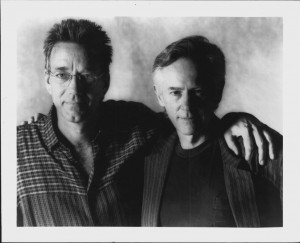Farewell, Ray Manzarek
Ray Manzarek, one of the giants of 1960s rock and roll, died yesterday at the age of 74. The co-founder of The Doors performed in Lowell once with The Doors, at the Commodore Ballroom in 1967, and twice with poet Michael McClure at the Smith Baker Center for the annual Kerouac literary festival. The Smith Baker Center is a former Congregational Church, a large brick edifice across the street from Lowell City Hall. Now closed and in disrepair, for a long time the Smith Baker Center was used for performances and community gatherings.
I had the privilege of giving Manzarek and McClure a private tour of the Jack Kerouac Commemorative the day before it was officially dedicated on a Saturday in late June 1988. I was accompanied by Rosemary Noon and possibly Brian Foye, then-president of the local Kerouac organization now called Lowell Celebrates Kerouac! Brian’s group had invited McClure and Manzarek, who had begun performing as a spoken word and music duo, to be part of a massive poetry reading set for the night before the dedication of the Commemorative.
Manzarek and McClure were awestruck by the sculptural tribute to Kerouac, all those words sandblasted into the polished reddish brown granite. Not the kind of words that are usually incised in stone. Not the words of a president or a general or a saint. The words of a writer who pushed the boundaries of prose-writing. Words of a poet from Lowell who wrote poems that looked like poetry, but who also told his friends that he wrote poetry in paragraphs or whole pages. Michael McClure at one point stepped back from one of the triangular granite pillars and said, “This is subversive.”
I was 13 years old when I first heard “Light My Fire” by The Doors on the radio. It was the summer of 1967, and my father had taken a job at the Cal Wool Co-op in Stockton, California. My mother, brother David, and I had joined him out there—we had moved from Dracut in the Merrimack Valley to the San Joaquin Valley, the Great Central Valley. We lived in a modern apartment complex built in a U-shape with an outdoor pool and paved plaza in the center. Day and night for weeks, transistor radios around the pool played “Light My Fire” with the volume cranked up. It was the Summer of Love in San Francisco, 60 miles away, but I was just a kid and didn’t have much of a clue about what was going on in Haight-Ashbury. I liked the music, but I was more interested in what the Red Sox were doing 3,000 miles away in their Impossible Dream season. Here’s a YouTube version of the song.
The night before the dedication ceremony, Manzarek and McClure performed for an audience of more than 1,000 people in the Smith Baker Center. Also on stage that night were Allen Ginsberg, Lawrence Ferlinghetti, Gregory Corso, John Weiners, and a few others, including a couple of writers from the community. McClure later described the event as the most important poetry reading in America that year, 1988. He wrote about his visit to Lowell in “California” magazine when he returned to his home near San Francisco. Manzarek and McClure came back to Lowell a few years later to play again at the Smith Baker Center for LCK! Below is a publicity photo of them at the time.
Ray Manzarek and Michael McClure

Great tribute Paul. The man was the unsung pure musical talent of The Doors. As a frustrated keyboard tickler, I marvel at his achievements back in the day when electric keyboards were rudimentary instruments. Just listen to “Riders of the Storm” and his absolute masterful re-creation of the illusions of rain from those fingers. Genius.